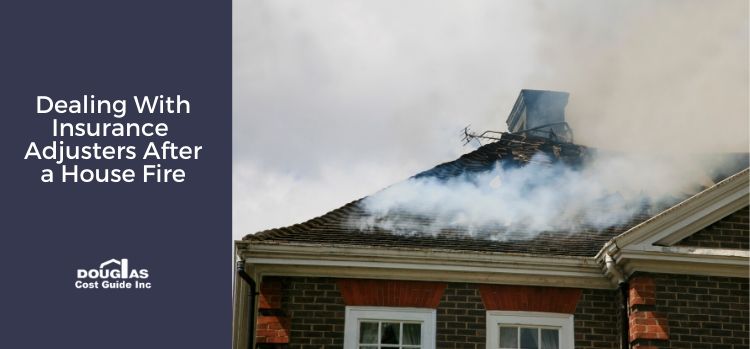Experiencing a house fire of any magnitude is a devastating ordeal. In the aftermath of a disaster, it can be difficult to wrap your mind around what to do next. After the flames are extinguished and your family is safe, the next step is to call your insurance provider to report the claim. Your insurance agent or broker will document the details of the incident: date, time, extent and location of damage. An insurance adjuster is typically assigned to your claim, at the discretion and direction of the insurance company.
Dealing with insurance adjusters after experiencing a home fire can be overwhelming, but armed with the right knowledge, questions and documentation can help alleviate some of the stress.
What to Do Before the Insurance Adjuster Arrives After a House Fire
If it’s safe to do so, before the insurance adjuster arrives, complete a walk-through of your home. Take photos of any damage, make a list of damaged items, the price paid for the items and if possible, find any relevant receipts.
Part of the claim process is to complete proof of loss documentation that details what was lost; creating the list and including relevant details prior to the adjuster’s arrival can help alleviate stressors later on.
Details to Provide Your Insurance Adjuster with After a House Fire
If possible, the following details can aid in the quick replacement of items:
- Receipt of purchase
- Photos of items
- Date of purchase
- Brand name
- Serial numbers
- Description
Read Through Your Insurance Policy and Ask Questions
Understanding your policy coverages, endorsements and limitations is important. Read through your policy or discuss your coverages with your agent or broker prior to the adjuster arriving. It’s important that you understand any limitations your policy may have or be prepared to provide additional details for specialty items or collections if necessary.
The estimate your adjuster provides will also be subject to the types of coverage you have. If you have an actual cash value policy, replacement of items will not be covered; it is important that you understand the coverage details of your policy prior to the adjuster’s arrival.
Verify Insurance Adjuster’s Identity
When your insurance adjuster calls to set-up an inspection date and time, take down their name and verify their identity upon arrival. Scams and fraud in the wake of a disaster can happen. Confirming the identity of your adjuster as a safety precaution is advised.
Complete the Walk-Through with the Insurance Adjuster
Being present for the appointment and completing the walk-through with your insurance adjuster after your house fire is imperative. Complete the entire walk-through with the adjuster, be sure to point out any issues or concerns you may have and ask questions.
It is important to discuss any items of significance or sentimentality with your adjuster. It’s their job to determine which items can be repaired and which require replacement; they generally err on the side of the most cost-effective measure. It may be more fiscally responsible to replace an area rug rather than pay for the expense of cleaning; however, if the area rug in question is a family heirloom it would be prudent to discuss this with your adjuster. Keep in mind that walking through your home after a fire can be an emotional experience. A lot of items may hold emotional significance for you but can be replaced.
Get a Second Opinion
Replacing lost items or rebuilding your home after a disaster is an emotional and trying experience. If you aren’t satisfied with the estimate the adjuster provides, it is best to ask questions and understand how the estimate was determined. If you still aren’t comfortable with the estimate, hiring a public adjuster from a third-party is an option to explore. Keep in mind the cost of hiring a third-party adjuster would be out of your own pocket and not covered by your insurance policy.
Visit the Douglas Residential Cost Guide to calculate your replacement cost and ensure you’re armed with an accurately estimated cost figure in the event of a total or partial loss.

